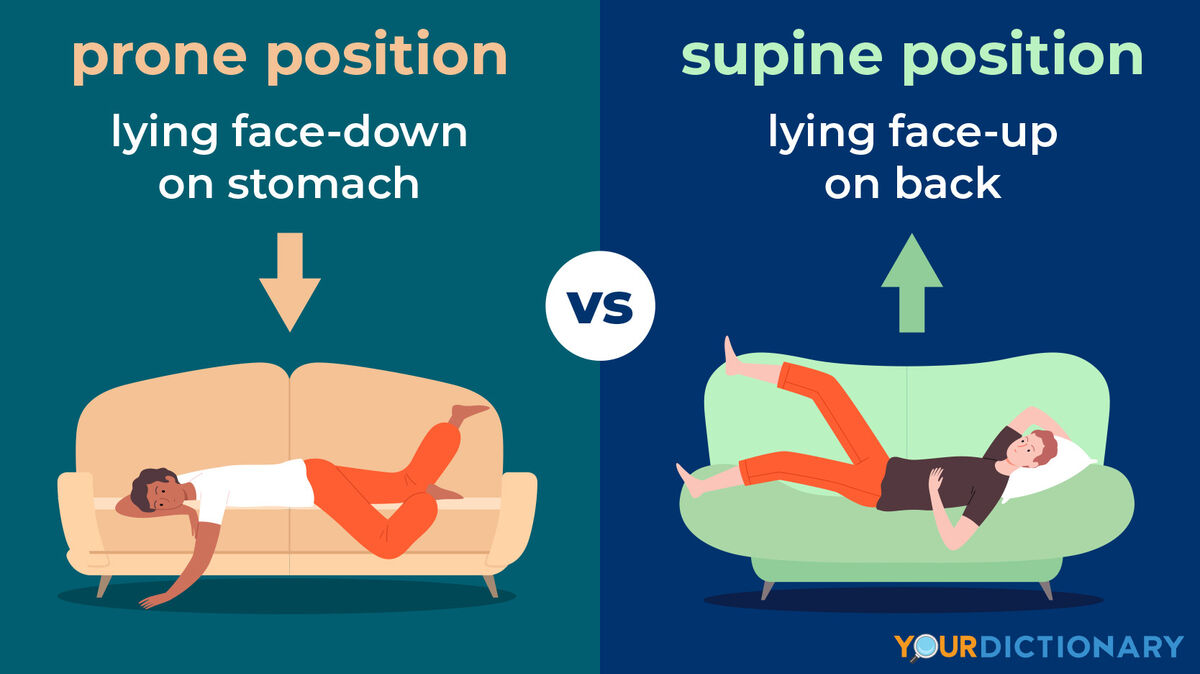
It's common for people to confuse the words prone and supine, but it's actually really easy to tell them apart. The difference between prone vs. supine is as easy as being able to tell up from down! Discover a foolproof way to always use these two terms correctly.
Distinguishing Prone vs. Supine
The words prone and supine are adjectives used to refer to the way a person's body is positioned when lying down. The prone position is the opposite of the supine position.
- prone - A person who is in a prone position is positioned with their face down. The individual is lying on his or her stomach.
- supine - Someone who is in a supine position is positioned with their face up. The person is lying on his or her back.
The difference is as simple as that. Being able to tell these terms apart simply requires knowing which one refers to being face down and which one refers to being face up.
Memory Tip for Prone and Supine Positions
An easy way to remember the difference between the prone and supine position is to match the first vowel in each word with the only vowel in the word that describes the way someone is facing when in either position.
- The word prone has an "o" in it, and so does the word down. People who are prone are facing down. They are lying on their stomach, which also has an "o."
- The term supine has a "u" in it, and so does the word up. People who are supine are facing up. They are lying on their back, so think about backing up.
These simple memory tips can make it easy to accurately choose between the words supine and prone to describe body position.
Prone and Supine as Anatomical Terms
The words prone and supine are anatomical terms used to describe body positioning. These words are used by medical professionals, personal trainers and others who deal with or discuss body mechanics.
- A person who prefers to sleep on his or her stomach likes to sleep in the prone position.
- Someone who is most comfortable sleeping on his or her back is a supine sleeper.
- For COVID-19 patients experiencing acute respiratory distress, research indicates that prone positioning can help improve ventilation and oxygen flow.
- The supine position is often used during cardiac procedures, as it provides clear access to the front of a patient's torso.
- In the prone position, a patient's hands are usually positioned with the palms facing up.
- In the supine position, a person's hands are usually positioned with the palms facing down.
These terms aren't limited to describing positioning specific to a human; these words can be used to describe the positioning of any organism.
Alternate Meaning for Prone
The word supine is only used in reference to body positioning, but prone has another meaning beyond its anatomical use. Prone also means that a person, animal or other thing is likely to behave or act a certain way.
- Steve is prone to take a long nap during the afternoon.
- Leigh is prone to take spontaneous trips at a moment's notice.
- My little sister is prone to running a fever.
- My dog is prone to jumping up on people.
- My cat is prone to hacking up hairballs.
This usage isn't likely to be confused with the word supine, as the two words don't sound alike and don't have similar meanings in this context. If a person is likely to mix up this meaning of prone with another word, it's more likely that the confusion would arise with the word prong or pronged. These terms sound similar to prone, but refer to an object that sticks out or branches off from something else.
Building a Basic Medical Vocabulary
Learning the difference between prone vs. supine as the words are used to describe body positioning is an important part of building a strong vocabulary of basic scientific terminology. Discover even more key medical vocabulary words once you have mastered the difference between these terms. From there, build on your foundational knowledge by learning the meaning of common medical suffixes. If you want to expand your vocabulary beyond a basic level, take the time to master medical abbreviations as well. Discover other positioning words that are commonly confused like stalagmite vs. stalactite.